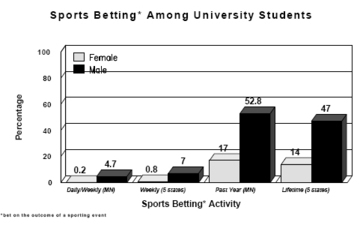The WAGER, Vol. 1(48) – Sports betting among athletes & undergraduates
Recent reports have documented the gambling behaviors of college football players who were involved in an illegal betting ring; some players had placed bets against their own team. Little information exists on the extent of illegal sports betting, particularly among athletes. However, a recent study randomly surveyed 2000 male student-athletes at Division I basketball and football programs to assess the extent of NCAA rules violations. Cullen et al. found that 3.7% of the student-athletes reported placing bets on games in which they played, and 25.5% of the respondents reported gambling on other college sporting events while they were in college. The response rate of this study was 32.4%; the generalizability of these results is limited. Related research examining gambling behavior among undergraduates asked specifically about sports betting. One study surveyed 1771 students from six colleges and universities in five different states (NJ, NV, NY, OK, TX). Another study surveyed 1770 students from three Minnesota campuses. The percentages of students who have ever and who regularly engage in sports betting is strikingly similar in these two studies. Both studies also found that male undergraduates participate significantly more in sports betting than female undergraduates.
Sources adapted from:
Beckham, L. (1996, November 11). Gambling’s seduction. Boston Herald, p. 26.
Cullen, F.T., Latessa, E.J., & Kopache, R. (1996). The extent and sources of NCAA rule infractions: A national self-report study of student-athletes. Cincinnati, OH: Division of Criminal Justice.
Lesieur, H.R., Cross, J., Frank, M., Welch, M., White, C.M., Rubenstein, G., Moseley, K., & Mark, M. (1991). Gambling and pathological gambling among university students. Addictive Behaviors, 16, 517-527.
Winters, K.C., Bengtson, P.L., Stinchfield, R.D., & Dorr, D. (1996). 1995 college gambling survey: University of Minnesota Twin Cities, University of Minnesota, Duluth, and Moorhead State University. Minneapolis, MN: Minnesota Department of Human Services Gambling Program, Mental Health Division.
This public education project is funded, in part, by The Andrews Foundation.
This fax may be copied without permission. Please cite The WAGER as the source.
For more information contact the Massachusetts Council on Compulsive Gambling,
190 High Street, Suite 6, Boston, MA 02110.
